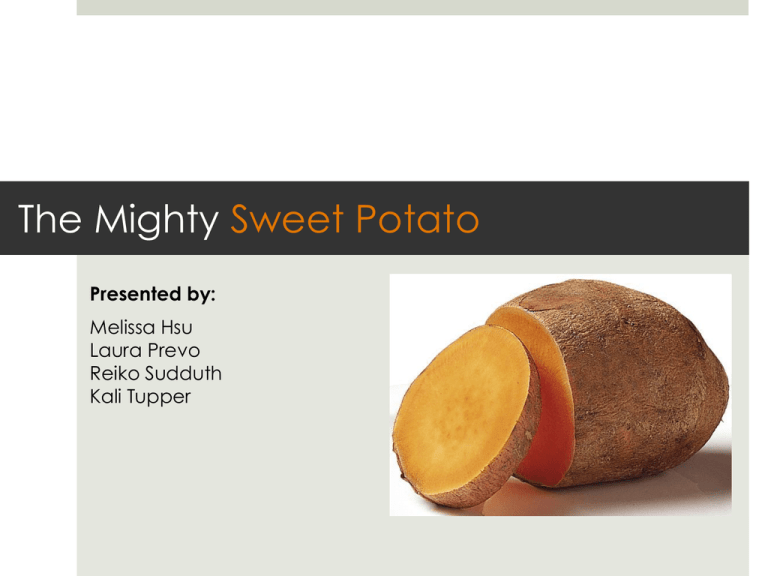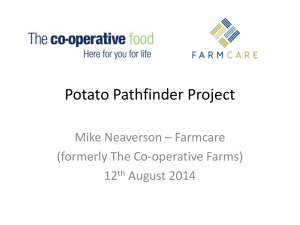
The Mighty Sweet Potato
Click to edit Master subtitle style
Presented by:
Melissa Hsu
Laura Prevo
Reiko Sudduth
Kali Tupper
Introduction
Sweet potatoes are a tuberous morning
glory
Also known as batatas, el boniato,
camote, and erroneously, yams
A species distinct from both yams and
potatoes
Introduction
Sweet potatoes are cultivated in tropical and
subtropical regions
North Carolina is the leading producer in
the U.S.
Harvested September – December
Can be found fresh, canned or frozen year-round
at any grocery store
Best to choose unblemished, wrinkle-free skin
Store in a cool, dark place
Do not refrigerate
Health Benefits
Sweet potatoes are a source of dietary carotenoids,
especially β-carotene 8
Our bodies can use β-carotene to make vitamin A,
helping prevent a vitamin A deficiency 10
Consuming carotenoids, including β-carotene, from
whole foods regularly may:
Decrease the risk of cancers such as breast, esophageal,
pancreatic, stomach, and lung cancer 8, 3
Promote heart health 8
Improve blood sugar regulation 9,11
Enhance the function of the immune system 8
Health Benefits cont.
In young adults aged 18–30 years old,
carotenoids may promote lung16 and
heart health,6 and lower the risk for
hypertension5 and inflammation.6
The CARDIA and YALTA studies
Serum carotenoids measured:
α-carotene, β-carotene, lutein/zeaxanthin,
β-cryptoxanthin, and lycopene
Sweet potatoes may have
antibacterial and antifungal properties,
as revealed in lab studies.18,12
Health concerns
Unlike whole food sources of carotenoids, supplemental
forms of β-carotene are associated with an increased risk
of cancer
Sweet potatoes contain approximately 26–99 mg of
oxalates per half cup serving 13
Oxalates occur naturally in plants and can crystallize in body
fluids if they become concentrated in large amounts in the
body, causing health problems 4
Individuals with the following health conditions are
advised to avoid sweet potatoes: 13
Calcium oxalate kidney stones
High urine oxalate levels (hyperoxaluria)
Bioactives: Carotenoids in Sweet Potato
Carotenoids in 100 g of Sweet Potato
Alpha
Beta
Carotene
Carotene (μg)
(μg)
Lutein +
Zeaxanthin
(μg)
Sweet potato, raw, unprepared
7
8,509
0
Sweet potato, cooked, baked in skin, without salt
43
11,509
0
Sweet potato, cooked, boiled, without skin
0
9,444
0
Sweet potato chips, unsalted
0
14,205
0
Sweet potato, canned, mashed
0
5,219
0
Sweet potato leaves, cooked, steamed, without salt
0
550
2,633
Source: http://ndb.nal.usda.gov/ndb/foods/list
Sweet Potatoes vs. Carrots:
Side-by-Side Comparison of Beta-Carotene Content
Preparation Method
Raw, unprepared
Cooked, baked in skin, without salt
Cooked, boiled, without skin
Chips, unsalted
Canned, mashed
Cooked, steamed, without salt
Source: http://ndb.nal.usda.gov/ndb/foods/list
Beta-Carotene
(μg)
Sweet
Carrot
Potato
(100 g)
(100 g)
8,509
8,285
11,509
9,444
8,332
14,205
5,219
550
Getting the most from your tatoe
Carotenoid content can vary with:
Age of root when harvested
Amount of moisture while growing
Mineral content of the soil
Virus infestation
Burri B. Evaluating sweet potato as an intervention
food to prevent vitamin A deficiency. Compr Rev
Food Sci Food Saf. 2011;10:118-130.
Getting the most from your tatoe
Choose those with the deepest orange-colored flesh.
white < cream < yellow = purple < orange
orange up to 1000 times the beta carotene of white
Getting the most from your tatoe
Beta-carotene well retained during cooking
Typical losses 0-12% (boiling, steaming, canning)
Up to 41% lost (dehydration)
Cooking process breaks down food matrix and
makes carotenoids more bioavailable
Eat with some fat
Beta-carotene absorbed via micelles
3-5 grams of fat increases absorption from <1%
to >25%
Recipe
Mashed Sweet Potatoes and Goat Cheese
This creamy, versatile dish can be served warm or cold and is sure to be a crowd pleaser. Choose organic, dark
orange sweet potatoes for maximum flavor and carotenoids.
Preparation time: 20 minutes
Makes 6 1/2-cup servings
Ingredients:
• 1 pound sweet potatoes
• 4 ounces goat cheese, crumbled
• 3 tablespoons butter, softened
• 1/2 teaspoon salt
• 1/4 teaspoon ground white pepper
Method:
Peel sweet potatoes and slice into one
inch rings.
Steam 10 minutes, or until soft and fully
cooked.
Place cooked sweet potatoes along
with remaining ingredients in a stand
mixer fitted with a whip attachment. Mix
on low speed until smooth and creamy.
Adapted by Laura Prevo from PCC Natural Markets at http://www.pccnaturalmarkets.com/pcc/recipes/pcc-mashed-yamsand-goat-cheese, author PCC Deli.
Did you know…
NASA selected sweet potatoes for long-term
space travel due to their amazing nutritional
content
The Center for Science in the Public Interest
(CSPI) named sweet potatoes as their #1 “Best
Food”
Did you know…
Orange sweet potatoes may be part of the
solution to vitamin A deficiency in Africa
Questions to ponder….
Sweet potatoes have been proposed as a solution
to prevent vitamin A deficiency in developing
countries.
What do you think are the benefits of providing sweet potatoes
instead of vitamin A or carotenoid supplementation to these
populations?
What ways of preparation are the best for optimal carotenoid
release from the food matrix?
References
1.
Bengtsson A, Namutebi A, Larson Alminger M, Svanberg U. Effects of various traditional processing methods on the all-trans-beta-carotene content of orange
sweet potato. J Food Comp Anal. 2008:21;134-143.
2.
Burri B. Evaluating sweet potato as an intervention food to prevent vitamin A deficiency. Comprehensive Reviews in Food Science and Food Safety. 2011:10;118130.
3.
Fraser PD, Bramley PM. The biosynthesis and nutritional uses of carotenoids. Prog Lipid Res. 2004;43(3):228-65.
4.
Holmes RP, Kennedy M. Estimation of the oxalate content of foods and daily oxalate intake. Kidney Int. 2000;57(4):1662-7.
5.
Hozawa A, Jacobs DR Jr, Steffes MW, Gross MD, Steffen LM, Lee DH. Relationships of circulating carotenoid concentrations with several markers of inflammation,
oxidative stress, and endothelial dysfunction: the Coronary Artery Risk Development in Young Adults (CARDIA)/Young Adult Longitudinal Trends in Antioxidants
(YALTA) study. Clin Chem. 2007;53(3):447-55.
6.
Hozawa A, Jacobs DR Jr, Steffes MW, Gross MD, Steffen LM, Lee DH. Circulating carotenoid concentrations and incident hypertension: the Coronary Artery Risk
Development in Young Adults (CARDIA) study. J Hypertens. 2009;27(2):237-42.
7.
K’osambo LM, Carey EE, Misra AK, Wilkes J, Hagenlmana V. Influence of age, farming site, and boiling on pro-vitamin A content in sweet potato (Ipomoea batas
(L.) Lam.) storage roots. J Food Technol Afr. 1999;4(3):77-84.
8.
Krinsky NI, Johnson EJ. Carotenoid actions and their relation to health and disease. Mol Aspects Med. 2005;26(6):459-51.
9.
Kusano S, Abe H. Antidiabetic activity of white skinned sweet potato (Ipomoea batatas L.) in obese Zucker fatty rats. Biol Pharm Bull. 2000;23(1):23-6.
10. Low JW, Arimond M, Osman N, Cunguara B, Zano F, Tschirley D. A food-based approach introducing orange-fleshed sweet potatoes increased vitamin A intake
and serum retinol concentrations in young children in rural Mozambique. J Nutr. 2007;137(5):1320-7.
11. Oki N, Nonaka S, Ozaki S. The effects of an arabinogalactan-protein from the white-skinned sweet potato (Ipomoea batatas L.) on blood glucose in spontaneous
diabetic mice. Biosci Biotechnol Biochem. 2011;75(3):596-8.
12. Noda N, Horiuchi Y. The resin glycosides from the sweet potato (Ipomoea batatas L. LAM. Chem Pharm Bull (Tokyo). 2008 Nov;56(11):1607-10.
13. Oxalosis & Hyperoxaluria Foundation. The oxalate content of foods. 2008. Retrieved from www.ohf.org/docs/Oxalate2008.pdf
14. Peggy Trowbridge Filippone. “Sweet Potato Facts, Selection, and Storage.” About.com Guide. The New York Times Company, n.d. Web. 10 May 2012.
<http://homecooking.about.com/cs/productreviews/p/sweetpotato_pro.htm>.
15. “Sweet Potato.” Wikipedia, The Free Encyclopedia. 9 May 2012. Wikimedia Foundation, Inc. Web. 10 May 2012. <http://en.wikipedia.org/wiki/Sweet_potato>.
1.
Thyagarajan B, A Meyer K, Smith LJ, Beckett WS, Williams OD, Gross MD, Jacobs DR Jr. Serum carotenoid concentrations predict lung function evolution in young
adults: the Coronary Artery Risk Development in Young Adults (CARDIA) study. Am J Clin Nutr. 2011;94(5):1211-8.
2.
Wilson CD, Pace RD, Bromfield E, Jones G, Lu JY. 1998. Sweet potato in a vegetarian menu plan for NASA’s Advanced Life Support Program. Life Support Biosph Sci.
5:347–51.
3.
Yin YQ, Huang XF, Kong LY, Niwa M. Three new pentasaccharide resin glycosides from the roots of sweet potato (Ipomoea batatas). Chem Pharm Bull (Tokyo).
2008 ;56(12):1670-4.








